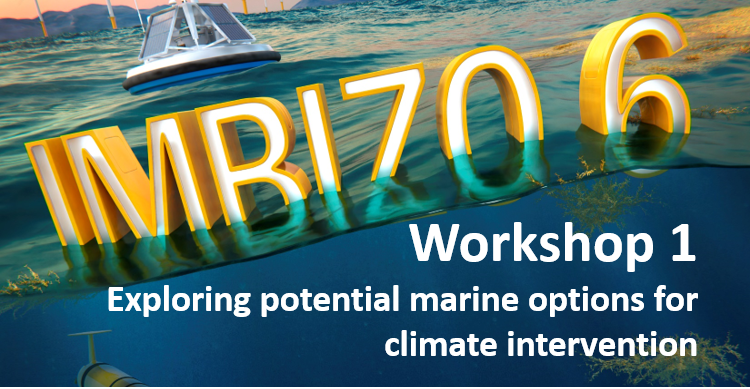
Workshop 1: Exploring potential marine options for climate intervention
Co-conveners: Ulf Riebesell (Germany), Philip Boyd (Australia), David Koweek (USA), Tanya Brodie Rudolph (South Africa)
IMBIZO 6 Recordings: IMECaN Event | Plenary and Keynote | Workshop 1 | Workshop 2 | Workshop 3
Keynote Speaker: Kerryn Brent (Australia)

Kerryn Brent is a lecturer in environmental law, climate change law and law of the sea at the University of Adelaide Law School, Australia. Kerryn researches in the fields of international and environmental law, examining how legal systems can facilitate effective responses to climate change. Her research primarily focuses on the governance of emerging climate intervention technologies, including solar geoengineering and carbon dioxide removal. These proposals present significant environmental, geopolitical and social risks that require comprehensive governance at international and domestic levels. Kerryn’s research considers how legal systems can meet these governance challenges and contribute to responsible climate intervention research and implementation. Kerryn holds a PhD from the University of Tasmania and Bachelor Degrees in Arts and Law from the University of Newcastle, Australia. She is admitted as a solicitor to the Supreme Court of New South Wales. Kerryn is a Deputy Director of the Australian Forum for Climate Intervention Governance, and a member of the Centre of Innovation for Recovery of Climate, Australia. Kerryn is also co-chair of the Australia and New Zealand Society of International Law Oceans and International Environmental Interest Group.
Invited Speaker

Dr. David P. Keller
Senior Research Scientist and Coordinator of the OceanNETs project, GEOMAR Helmholtz Centre for Ocean Research, Kiel, Germany
Email: dkeller@geomar.de
David completed a Ph.D. in Marine, Estuarine, and Environmental Science from the University of Maryland in 2010 and then joined the Marine Biogeochemical Modelling Department at the GEOMAR Helmholtz Centre for Ocean Research in Kiel, Germany where he is now a senior research scientist. His research expertise and interests are broad and include assessing the potential and feasibility of carbon dioxide removal (negative emissions) approaches for climate change mitigation, understanding feedbacks between biogeochemical cycles and the climate, and investigating interactions between marine ecosystems and biogeochemical cycles. David uses Earth system models to conduct much of his work and enjoys collaborating with scientists from a wide range of other disciplines when working on complex research topics. David currently leads the EU Horizon 2020 project OceanNETs, which investigates ocean-based negative emission technologies, co-leads the Carbon Dioxide Removal Model Intercomparison Project (CDRMIP), and also leads a work package in the EU Horizon 2020 project COMFORT, which investigates tipping points in the climate system. He is a contributing author on the topic of carbon dioxide removal to the forthcoming Intergovernmental Panel on Climate Change Report (Working Group I Sixth Assessment; AR6).
About this workshop
With the Paris Agreement, 197 countries have agreed to limit global warming to well below 2°C and preferably to no more than a maximum of 1.5°C. In October 2018, the Intergovernmental Panel on Climate Change presented a special report stating that the 1.5°C target is still achievable, but only if anthropogenic CO2 emissions start falling sharply now and reach net zero by 2050. The report also made clear that net zero emissions will not be achievable without employing some form of active CO2 removal, referred to as carbon dioxide removal strategies (CDR). The failure of the world to curb fossil fuel emissions and the inadequacy of planned mitigation measures is consistent with the intergenerational injustice of anthropogenic climate change. This formidable challenge has led to international calls for urgent research into a portfolio of CDR options to understand their feasibility, scope, costs and challenges. The focus with CDR approaches presently lies on possible solutions on land, such as afforestation and bioenergy with carbon capture and storage (BECCS). These and other land-based options are often in conflict with other societal interests, such as food security, urbanisation and ecosystems conservation.
What role can the ocean play in achieving the 1.5°C target? By absorbing 90% of the extra heat generated by global warming and more than 25% of the CO2 released from human activities, the ocean already serves as a powerful buffer in the Earth’s climate system. Ocean-based CDR approaches have the potential to capture and store globally significant amounts of CO2. This workshop is an invitation to step into the interface between IMBeR scientists, environmental managers, and environmental regulators to explore marine CO2 removal and its long-term storage potential, and to illuminate the economic, social, and political challenges and opportunities around ocean-based CDR. This cutting edge workshop will enable participants to explore how we can collectively design parameters for responsible research and development that will inform potential pathways towards full scale deployment and its feasibility. IMBeR scientists have a pivotal role to play in adaptive governance of ocean-based CDR research and implementation.
Objective
The workshop will provide opportunities for exchange across all disciplinary levels, provide a point of entry into this field, and facilitate the development of new skillsets by bringing together scientists and stakeholders from a variety of disciplines, ranging from oceanography, climate research, marine ecosystem management and protection to environmental economics, law of the sea and public perception. Using aspects of the 2019 GESAMP WG41 report as a point of departure the workshop will aim to create an enhanced appreciation for the multi-faceted challenges which must be overcome by:
- Increasing the number of social scientists working on ocean-based CDR to illuminate the economic, social, and political challenges and opportunities around ocean-based CDR;
- Engaging a global community of governance experts to consider mechanisms to facilitate and accelerate RD&D, identify pathways to embed marine CDR into international governance as well as localised governance frameworks, and develop considerations for permitting processes for small scale proof of concept field trials;
- Working with the ocean conservation and IMBeR science community to assess the potential of candidate marine CDR approaches and locations by highlighting the co-benefits to the environment and people of ocean-based CDR approaches (for example large scale kelp farming can also create habitat, remediate nutrients or attenuate wave energy; ocean alkalinity enhancement can help in mitigating ocean acidification) and by identifying potential environmental risks as well as opportunities to mitigate these risks.
Objectives and expected impact
The workshop outcome will include a perspective paper which synthesises state of the art knowledge, offers rich transdisciplinary insights on social, political, governance and economic challenges of marine CDR approaches and provides guardrails for the evolution of marine climate intervention. In addition, participants will be introduced to the Ocean Visions’ Ocean-based Carbon Dioxide Removal Road Maps (https://oceanvisions.org/roadmaps), their functionality, content and listed priorities, and trained on how to enroll as contributors to keep the information and activities of the field up-to-date for community benefit.
Already existing:
- High level report: GESAMP WG41 report (2019) “High level report of a wide range of proposed marine geoengineering techniques”. http://www.gesamp.org/work/groups/41
- Schäfer S, Lawrence M, Stelzer H, Born W, Low S, Aaheim A, Adriazola P, Betz G, Boucher, O Carius A, Devine-Right P, Gullberg A, Haszeldine RS, Haywood J, Houghton K, Ibarrola R, Irvine P, Kristjánsson J, Lenton T, Watson, IM (2015) The European Transdisciplinary Assessment of Climate Engineering (EuTRACE): Removing Greenhouse Gases from the Atmosphere and Reflecting Sunlight away from Earth. DO-10.2312/iass.2015.018
- Special issue: Frontiers Research Topic ”The Role of Ocean-based Negative Emission Technologies for Climate Mitigation“. Editors: David Peter Keller, Lennart Thomas Bach, Kerry Brent, Wilfried Rickels
- Special issue: Frontiers Research Topic: “Scaling-Up Negative Emissions: The Power of Leveraging Policy, Philanthropy, Purchasing and Investment“. Editors: Noa Deich, Gregory M Dipple, Keith Paustian, Phil Renforth, Jennifer Wilcox
- Perspective paper: Boyd P & Vivian C (2019) Should we fertilize the oceans or seed clouds? No one knows. Nature 570, 155